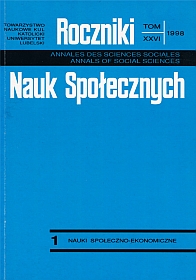Czynniki konstytuujące samookreślenie się narodowe w opinii młodzieży polskiego pochodzenia z b. ZSSR studiującej w Polsce
Abstrakt
These empirical researches on the Polish youth from abroad who currently study in Lublin. The findings, discussed in this paper, seek to answer the following question: what significance do the subjects ascribe to some selected criteria which decided about their national membership? What is their driving motive when assessing personal importance of those criteria? What are the psychosocial conditions of those evaluations?
Among the differentiating traits, making up a group of necessary and sufficient conditions for a man to be a member of a given nationality, we find genealogical origin, knowledge about national culture, language, religion (denomination), personal choice, place (country) of birth and residence, place of baptism and the data concerning parents' nationality as they are contained in the certificate of birth. It has been established that the group under study, while assessing the importance of the factor deciding about their national membership, evaluated them basically as a dimension of the trait of membership to a community versus the trait of membership to a territory. The second dimension may be defined as genealogical determinism versus freedom in choosing one's national membership.
No correlation has been found between the ranking of such variables as place of permanent residence (town, village), sex, year of studies at the level which is statistically essential. Greater or lesser differentiation of the importance ascribed to particular criteria, and measured by an appropriate statistical test, is in relation to parent's nationality, national self-identification of the subject, the language of communication in his or her family, the kind of relationship she or he has with their surrounding during their stay in Poland and its consequent frustration grounded on one's national or religious individuality.
Copyright (c) 1998 Roczniki Nauk Społecznych

Utwór dostępny jest na licencji Creative Commons Uznanie autorstwa – Użycie niekomercyjne – Bez utworów zależnych 4.0 Międzynarodowe.


